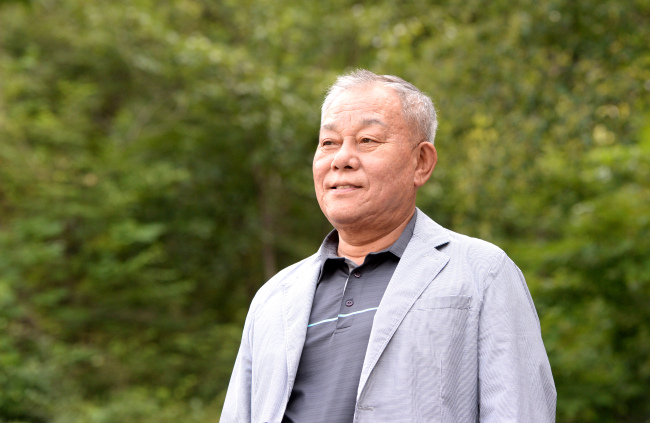‘The Last Empress’ gets an overhaul for its 20th anniversary
Musical director Yun Ho-jin believes works with heavy themes have staying power
By Korea HeraldPublished : July 17, 2015 - 20:27
Known as the godfather of Korean musicals, Yun Ho-jin occupies a special place in the Korean musical scene 20 years after he burst upon the scene with “The Last Empress,” a large-scale original musical, the likes of which had never before been seen in Korea.
 An adaptation of a novel by Yi Min-yol based on the assassination of Queen Min, also known as Empress Myeongseong, by Japanese killers in 1895, the grand opera-like musical took the nascent local musical scene by storm when it premiered at the Seoul Arts Center Opera House in 1995.
An adaptation of a novel by Yi Min-yol based on the assassination of Queen Min, also known as Empress Myeongseong, by Japanese killers in 1895, the grand opera-like musical took the nascent local musical scene by storm when it premiered at the Seoul Arts Center Opera House in 1995.
Now, a revised version of “The Last Empress” will be staged at the SAC Opera House from July 25-Sept. 12.
“New songs have been added and old ones rewritten. We also have a completely new cast,” says Yun during an interview with The Korea Herald on July 14 at a cafe at the foot of Mount Namsan near the rehearsal venue.
“The Last Empress” is a very physical piece featuring lots of martial arts movements. Many of the performers at the rehearsal wore knee pads and tape over their injuries.
 An adaptation of a novel by Yi Min-yol based on the assassination of Queen Min, also known as Empress Myeongseong, by Japanese killers in 1895, the grand opera-like musical took the nascent local musical scene by storm when it premiered at the Seoul Arts Center Opera House in 1995.
An adaptation of a novel by Yi Min-yol based on the assassination of Queen Min, also known as Empress Myeongseong, by Japanese killers in 1895, the grand opera-like musical took the nascent local musical scene by storm when it premiered at the Seoul Arts Center Opera House in 1995.Now, a revised version of “The Last Empress” will be staged at the SAC Opera House from July 25-Sept. 12.
“New songs have been added and old ones rewritten. We also have a completely new cast,” says Yun during an interview with The Korea Herald on July 14 at a cafe at the foot of Mount Namsan near the rehearsal venue.
“The Last Empress” is a very physical piece featuring lots of martial arts movements. Many of the performers at the rehearsal wore knee pads and tape over their injuries.

“The assassination scene where the stage revolves at an angle is a dangerous scene to do. They need to be thoroughly trained now so that they don’t hurt themselves on the day of the performance,” Yun says.
In 1997, “The Last Empress” made history by becoming the first Korean musical ever to be performed at the New York State Theater at the Lincoln Center, New York, where it received great reviews.
“The Last Empress” held its return engagement the following year. For the two-week run at London’s Apollo Theater in 2002, “The Last Empress” was staged in English, made possible by the fact that Yi Tae-won, playing the role of the ill-fated empress, spoke fluent English as she had grown up in the U.S. For the rest of the cast, however, it was a great challenge.
“A London musical critic said it was ‘bold,’” says Yun with a chuckle. It has not been performed in English since.
Since the premiere of the original version, which took five years to prepare for, numerous changes were made, mostly to the musical arrangement, to keep it fresh and updated, even before the 20th anniversary overhaul. In the latest version, “The Last Empress” has been given a dramatic makeover, including a romantic role for the captain of the guards put in charge of protecting the empress, and a number of new songs.
The fact that “The Last Empress” has been performed for 20 years is a remarkable feat, an achievement that puts it on par with the Big Four Musicals ― “Cats,” “Les Miserables,” “Miss Saigon” and “Phantom of the Opera” ― that have been staged for more than 20 years, Yun says.
“Ours continues to evolve, making it unique in the world,” he adds.
In fact, it was during a performance of “Cats” that he attended while on a trip to London in 1982 that Yun had his epiphany. “I told myself, ‘I must do this,’” he recalls.
By that time, he was already an award-winning stage producer, known for serious plays such as “Island,” a drama about human rights in South Africa, which was just as relevant in dictatorial Korea. Determined to pursue musicals, he left for New York in 1984 to study musical production. He returned to Seoul in 1987, staging “Guys and Dolls” as the opening piece for the newly built Seoul Arts Center.
Since then, Yun has been creating original Korean musicals such as “The Last Empress” and “Hero,” which premiered in 2009 to mark the centenary of the death of independence fighter An Jung-geun.
What message is Yun trying to send with “The Last Empress” and “Hero,” which are both set in the Japanese colonial period and have anti-Japanese colonialist themes?
“I wanted to ask why a country exists. The finale of ‘The Last Empress,’ ‘Rise, People of Joseon,’ calls on people to put the country first,” Yun explains.
Why the predilection for such heavy themes?
“I think someone has to do this. Of course there are many difficulties and hardships. But it is the heavier works that have the staying power,” Yu says.
While “Hero” is a sequel to “The Last Empress,” work is underway for a musical about the Japanese military sex slaves during World War II which would complete the trilogy. A Japanese-Korean author is already working on the script and Yun expects the musical to be ready after 2017.
“I thought an outside perspective is necessary to put things in balance,” Yun says in explaining why a Japanese-Korean author had been recruited for the project.
“’The Last Empress’ will continue to be staged as long as Japan exists. I think this will be by far the best ‘The Last Empress’ ever,” he says with confidence. And that confidence is not without basis. “The actors and actresses are world class,” Yun says.
Yun, who directed the presidential inauguration ceremony in 2013, has been put in charge of directing events celebrating the 70th anniversary of Korea’s independence from Japan on Aug. 15.
“The reason I accepted the offer to do this is because I wanted to do something very different, something that is void of the ‘bureaucratic touch’ that is so typical of such government events,” Yun says.
By Kim Hoo-ran (khooran@heraldcorp.com)
-
Articles by Korea Herald







![[Graphic News] More Koreans say they plan long-distance trips this year](http://res.heraldm.com/phpwas/restmb_idxmake.php?idx=644&simg=/content/image/2024/04/17/20240417050828_0.gif&u=)
![[KH Explains] Hyundai's full hybrid edge to pay off amid slow transition to pure EVs](http://res.heraldm.com/phpwas/restmb_idxmake.php?idx=644&simg=/content/image/2024/04/18/20240418050645_0.jpg&u=20240419100350)






![[From the Scene] Monks, Buddhists hail return of remains of Buddhas](http://res.heraldm.com/phpwas/restmb_idxmake.php?idx=652&simg=/content/image/2024/04/19/20240419050617_0.jpg&u=20240419175937)

![[KH Explains] Hyundai's full hybrid edge to pay off amid slow transition to pure EVs](http://res.heraldm.com/phpwas/restmb_idxmake.php?idx=652&simg=/content/image/2024/04/18/20240418050645_0.jpg&u=20240419100350)

![[Today’s K-pop] Illit drops debut single remix](http://res.heraldm.com/phpwas/restmb_idxmake.php?idx=642&simg=/content/image/2024/04/19/20240419050612_0.jpg&u=)